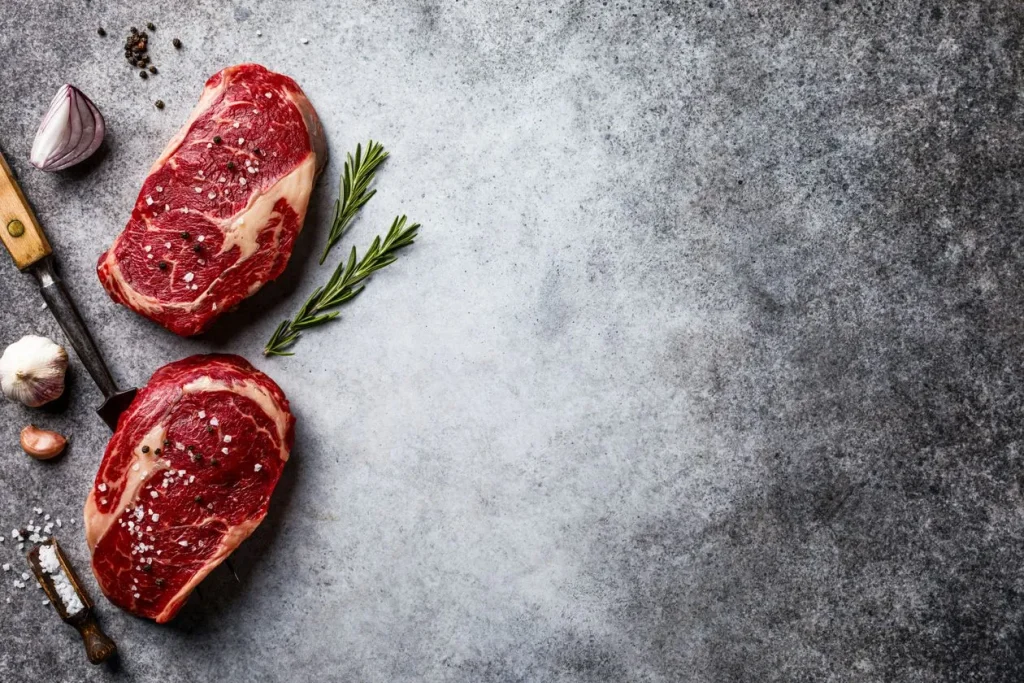Last updated on June 14th, 2025 at 01:47 pm
If you’re following the carnivore diet, you might think that flavor is off the table. But that’s not entirely true! While this diet focuses on animal products, you can still spice things up with certain seasonings. Understanding what seasonings are allowed on the carnivore diet can help you enjoy your meals more without straying from the core principles of this eating plan. Let’s look at how you can enhance your carnivore meals without compromising your dietary choices.
► Table of Contents
Key Takeaways
- You can use certain herbs and spices in small amounts on the carnivore diet without breaking the rules.
- The focus is on minimizing plant matter, so tiny quantities of seasonings are generally acceptable.
- Animal-based sauces like butter and cream can add flavor while staying true to the carnivore diet.
The Role of Spices and Herbs on a Carnivore Diet

Have you ever wondered how to spice up your carnivore meals and make them more exciting? You’re not the only one! A lot of people on the carnivore diet find themselves missing the variety and complexity of flavors that come from a more diverse diet.
That’s where spices and herbs come into play a crucial role. They can be like flavor boosters, transforming a simple steak into something truly delicious and mouthwatering. But which ones are okay to use without compromising the principles of the diet? Let’s take a closer look at the best spices that are suitable for the carnivore diet and how they can enhance your meals.
Enhancing Flavor Without Compromise
The carnivore diet is all about keeping things simple and straightforward. It primarily consists of meat, fish, and eggs, which are the cornerstone of this dietary approach. The underlying idea is that our ancestors thrived on this kind of diet, and many of the modern health problems we face today can be traced back to the consumption of plant-based foods.
However, simple doesn’t have to mean boring or lacking in flavor! By incorporating a variety of spices and herbs, you can significantly enhance the enjoyment of your meals and make the diet much easier to adhere to over the long term. After all, the best diet is one that you can actually maintain and enjoy without feeling deprived.
The Principle of Minimal Plant Matter
So, you might be thinking, “Wait, aren’t spices and herbs plants?” Good question! The answer has to do with using only a tiny bit of plant matter, which is a crucial aspect of the carnivore diet. The carnivore diet isn’t about cutting out plants completely; it’s about keeping them to a minimum so they don’t mess with your body and disrupt the intended benefits of the diet.
When you use herbs and spices, you’re using such small amounts that they probably won’t cause any problems or interfere with your body’s natural processes. Think about it: how much dried thyme do you use on a steak? Not much! In fact, it’s often just a sprinkle, which is a negligible amount in the grand scheme of things. This allows you to enjoy the flavors without compromising the principles of the diet.
Plus, many people on the carnivore diet find that these small amounts of herbs and spices help them stick to the diet because they make the food taste better. And if a little bit of cumin helps you stay on track, that’s a good thing, right?
Understanding the Carnivore Diet
To really get a comprehensive understanding of why some seasonings are considered acceptable within the context of the carnivore diet, it helps to delve deeper into the principles and foundations of the carnivore diet itself. This diet is primarily based on the consumption of animal products, which means that the majority of what you eat comes from meat, fish, eggs, and other animal-derived foods.
The overarching goal of this dietary approach is to eliminate foods that might trigger inflammation or lead to digestive issues for certain individuals. However, it is important to recognize that everyone is unique, and some people may be able to tolerate small amounts of specific plant-based foods without experiencing any adverse effects.
Therefore, when it comes to identifying the best spices for the carnivore diet, it ultimately boils down to discovering what works best for your individual body and preferences. If you are interested in learning more about the carnivore diet and its guidelines, you can find a wealth of information available online.
Recommended Articles
Why Herbs and Spices Don’t Break Carnivore Diet Rules

You might be curious about how herbs and spices fit into a carnivore diet, especially considering that they come from plants, right? The good news is, you don’t necessarily have to ditch them completely in order to adhere to the principles of this unique dietary approach.
It’s all about understanding the fundamental principles of the diet and how these flavorful seasonings can impact your body in various ways. By incorporating them mindfully, you can enhance your meals without compromising your dietary goals.
Quantity and Impact on Ketosis
One of your main concerns might be whether using herbs and spices will kick you out of ketosis. The amount of carbs in the herbs and spices you’d typically use is so small that it’s unlikely to affect your metabolism.
For example, a teaspoon of dried thyme has a negligible amount of carbs. Even if you’re generous with your seasoning, it won’t push you over the carb limit that affects ketosis. Some people on the carnivore diet choose to avoid all plant matter, including seasonings.
This is often called the “lion diet” or “strict carnivore” and can be helpful for those doing elimination diets or dealing with autoimmune issues. However, for many, the benefits of including USDA organic spice blends outweigh the drawbacks.
The carnivore diet isn’t about achieving zero plant consumption; it’s about minimizing plant foods to the point where they don’t significantly impact your physiology or digestion. When you use herbs suitable for carnivore eating, you’re adding such tiny amounts of plant matter that they’re unlikely to cause digestive issues or inflammatory responses that larger amounts of plant foods might trigger. Think about it: how much dried basil do you actually use when you’re seasoning a steak? It’s a very small amount.
Many people find that these small amounts of herbs and spices help them stick to the diet by making meals more enjoyable. If a pinch of rosemary or a sprinkle of oregano helps you maintain your carnivore-friendly herbs lifestyle long-term, that’s a positive thing.
Here’s a simple breakdown:
- Small quantities of herbs suitable for a carnivore lifestyle are unlikely to cause issues.
- They can make the diet more sustainable for you.
- They add variety and flavor to your meals.
Related article: Carnivore Diet: Benefits, Risks, Meal Plan and Food List
Permissible Seasonings for Carnivore Diet Enthusiasts
Essential Seasonings
When you’re on a carnivore diet, you might think flavoring options on a meat diet are limited, but that’s not entirely true. Salt is your best friend. It’s not just for taste; it’s vital for maintaining electrolyte balance, especially when you cut out carbs. Beyond salt, consider these options:
- Black Pepper: A classic choice that adds a bit of spice.
- White Pepper: A milder alternative to black pepper.
- Red Pepper Flakes: For those who like a little heat.
Remember, the key is moderation. You’re aiming to enhance the natural flavors of the meat, not mask them. Pay attention to how your body reacts to each seasoning. Some people are more sensitive than others.
Exploring Animal-Based Sauces
Looking for carnivore diet condiments to add some zing? Animal-based sauces can be a great way to introduce variety. Think about these:
- Bone Broth: Not just a sauce, but a nutrient-rich addition to your meals.
- Butter-Based Sauces: Béarnaise or Hollandaise can add a tangy flavor.
- Cream Sauces: Especially those made with beef broth or bone marrow.
Experiment with different animal fats and spices for a meat-based diet, like ghee. Always check the ingredients to ensure they align with the carnivore diet principles. The goal is to find suitable seasonings for meat dishes that you enjoy and that support your health goals.
Related article: 10 Side Effects of The Carnivore Diet and How to Manage Them
Wrapping It Up: What Seasonings Are Allowed on Carnivore Diet
In conclusion, the carnivore diet doesn’t have to be a flavorless journey. While it emphasizes eating animal products, adding a few carefully chosen herbs and spices can really spice things up. Just remember, moderation is key. A sprinkle of salt, a dash of pepper, or a hint of rosemary can make your meals more enjoyable without straying from the diet’s core principles. If you find that a little garlic or some animal-based sauces help you stick to your plan, then go for it—just keep it minimal. Ultimately, the goal is to create a sustainable eating habit that you can enjoy long-term.
If you’re struggling to find a reliable coach to guide you on your fitness journey, we can connect you with one. Just message us by clicking the button below and tell us your goals—whether it’s trying a specific diet, fasting, or a combination of both—so we can match you with your ideal lifelong coach.
Frequently Asked Questions
Can I use spices on a carnivore diet?
Yes, you can use certain spices and herbs. They can add flavor to your meals without breaking the diet’s rules.
What are some good seasonings for the carnivore diet?
Some popular seasonings include salt, black pepper, and herbs like rosemary and thyme. These can enhance the taste of your meat dishes.
Will using herbs affect my ketosis on the carnivore diet?
No, the amount of herbs and spices typically used is so small that they won’t significantly impact your ketosis.
Related Articles
- Carnivore Diet: Benefits, Risks, Meal Plan and Food List
- 10 Side Effects of The Carnivore Diet and How to Manage Them
- Carnivore Diet Supplements
- 30-day Carnivore Diet Meal Plan PDF for Beginners
- Fasting on Carnivore Diet: What You Need to Know
- Can You Eat Pork Rinds on Carnivore Diet
- Best Magnesium Supplement for Carnivore Diet
- Do Calories Matter on Carnivore Diet? Unpacking the Myths and Realities
- The Ultimate Diet Guide: Strategies for Effective Weight Loss
- How to Lower Cholesterol on Carnivore Diet
- Fiber on Carnivore Diet: Do You Need It?
- Should You Take A Multivitamin on Carnivore Diet?
Syker Reid, the dynamic founder of Syktohealth, is a force in the health and fitness realm. Drawing on personal weight loss triumphs, he's committed to helping others achieve their health goals. With a degree in Exercise Science and Nutrition and a Certified Personal Trainer title under his belt, Reid's advice is both practical and science-backed.
Reid has grown Syktohealth into a trusted platform for weight loss, resonating with thousands seeking solid, achievable advice. His assertive yet approachable style, coupled with his professional knowledge and personal experience, makes him a credible guide for your weight loss journey. Under Reid's leadership, Syktohealth continues to empower individuals towards a healthier life.

